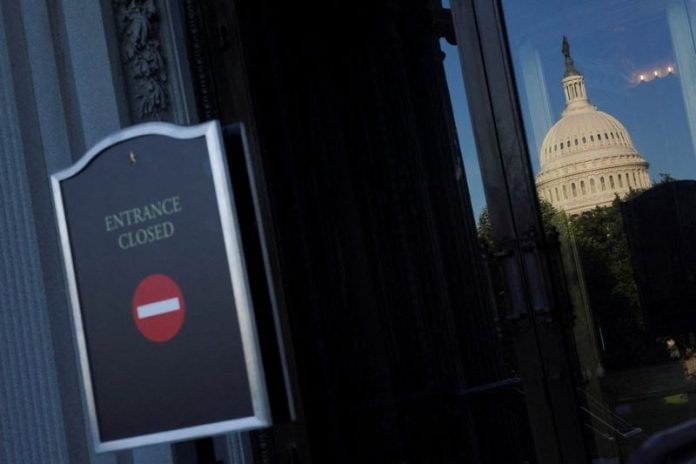By David Morgan, Bo Erickson, Nolan D. McCaskill and Richard Cowan
WASHINGTON (Reuters) -President Donald Trump’s administration on Wednesday froze funding for major transportation projects in New York, home to Congress’s top two Democrats, as it carried through on a threat to use the government shutdown to target Democratic priorities.
The funding freeze came as the 15th government shutdown since 1981 suspended scientific research, financial oversight, environmental cleanup efforts and a wide range of other activities.
Some 750,000 federal workers were ordered not to work, while others, such as troops and border patrol agents, were ordered to work without pay. The Department of Veterans Affairs said it would provide burials at national cemeteries, but would not erect headstones or mow the grass.
Trump has threatened to use the shutdown to extend a purge of the U.S. civil service that is already on track to push out some 300,000 workers by December, but he did not announce any immediate job cuts. Instead, the administration extended its pattern of targeting Democratic cities and states through funding cuts.
Following the $18 billion New York funding freeze, the White House taunted top Senate Democrat Chuck Schumer, posting a digitally manipulated image of the New York lawmaker dressed as a hot dog.
“He is using the American people as pawns, threatening pain on the country as blackmail,” Schumer said.
On Capitol Hill, the Senate again rejected efforts to keep the government functioning as both a Republican proposal that would fund the government through November 21 and a Democratic vote that would pair funding with additional health benefits failed in floor votes.
Trump’s Republicans hold a 53-47 Senate majority, but they need the support of at least seven of Schumer’s Democrats to meet the chamber’s 60-vote threshold for spending bills.
At issue on the government funding front is $1.7 trillion for agency operations, which amounts to roughly one-quarter of the government’s total $7 trillion budget. Much of the remainder goes to health and retirement programs and interest payments on the growing $37.5 trillion debt.
BIPARTISAN GROUP SEEKS PATH FORWARD
A bipartisan group of senators huddled on the floor during the vote, trying to find common ground for a path forward.
Senator Tim Kaine, a Virginia Democrat who represents many federal workers near the nation’s capital, offered a potential way out of a shutdown if Trump stops cuts to federal services and workers.
“I want to see that a deal is a deal, and I would like to see the Republicans make a commitment to work with us on health care,” Kaine said. “But I’ve never said that has to be all I’s dotted and T’s crossed because that could be complicated.”
Several government agencies posted notices on their websites blaming the “radical left” for the shutdown – a breach of long-standing Washington norms and a law known as the Hatch Act meant to insulate nuts-and-bolts government services from partisan politics.
Vice President JD Vance issued an unusual warning about air safety, noting that air traffic controllers and airport security personnel would be working without pay.
“If you’re flying today, I hope, of course, you arrive safely and on time, but you may not arrive on time,” Vance said on Fox News.
The longest U.S. government shutdown, which stretched over 35 days in 2018-2019 during Trump’s first term, ended in part after flight delays caused by air traffic controllers calling in sick.
Both sides sought to pin the blame on the other, looking for advantage ahead of the 2026 midterm elections that will determine control of Congress.
Democrats said Republicans were responsible for the disruption, as they control the levers of power in Washington. “It is on them to engage us,” said Democratic Representative Pete Aguilar of California.
Republicans said Democrats were surrendering to partisan pressures to oppose Trump, even though they have routinely backed routine spending bills in the past. They also repeated a false claim that the Democratic proposal would extend health coverage to people who are in the country illegally. According to the nonpartisan Congressional Budget Office, the Democratic plan would only restore coverage to certain categories of immigrants who are in the country legally, such as asylum seekers and people on work visas.
Republican Senate Leader John Thune dismissed concerns that Trump’s decision to freeze construction spending in New York amounted to hostage-taking.
“Well, vote to open up the government and that issue goes away, right? I mean, it’s pretty straightforward,” he said at a press conference.
Democrats are under pressure from their frustrated supporters to score a rare victory in Washington, and the healthcare push has given them a chance to unite behind an issue that resonates with voters.
Along with the extended health subsidies, Democrats have also sought to ensure that Trump will not be able to undo those changes if they are signed into law. Trump has ignored other spending bills approved by Congress, prompting some Democrats to question why they should vote for any spending legislation at all.
(Reporting by Richard Cowan, Nolan D. McCaskill, Bo Erickson and David Morgan; additional reporting by Mike Stone, Doina Chacu, Jasper Ward and Katharine Jackson; writing by Andy Sullivan; editing by Scott Malone, Lincoln Feast and Alistair Bell)
Disclaimer: This report is auto generated from the Reuters news service. ThePrint holds no responsibility for its content.





